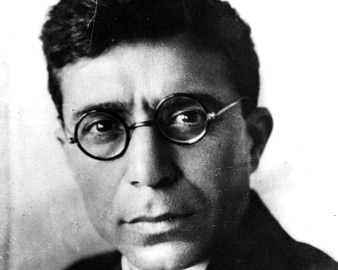114th anniversary of writer and playwright Jabbarli to be marked in Baku

By Nigar Orujova
The 114th anniversary of well-known Azerbaijani play and screen writer, poet Jafar Jabbarli as well as an event dedicated to the 140th anniversary of the Azerbaijani theater will be held in the Jafar Jabbarli house museum in Baku on Friday, April 12.
According to house-museum head Qemer Bagirova, an exposition on the life of Jabbarli, as well as other prominent figures of the time and the way the national theater developed, will be shown at the museum lobby, along with a photo exposition reflecting the lives of grand Azerbaijani men of art.
Intellectuals and literary critics will speak about the works, life and influence of Jabbarli on the Azerbaijani theater art.
Moreover, the conferral of the Jafar Jabbarli award also dedicated to the playwright's anniversary will be held in the Azerbaijan State Song Theater on Saturday.
The Jafar Jabbarli award was established in 2001, when the 100th anniversary of the author was marked.
Born in 1899, Jafar Jabbarli is one of the Azerbaijani most talented and prolific artists, whose works are still topical, which can be seen in his plays that are still staged, and films based on his works that are still screened.
The author's focus was on the theater where he achieved great success. The works including Baku War, Devoted Sariyya or Laughter through Tears, Shah Nasreddin, Bride of Fire, Sevil, and Almaz, gained widespread acclaim among readers and viewers.
Jabbarli was also committed to cinema. He believed in the development and future success of the art and along with his theater work, he became the first Azerbaijani screenwriter.
Jabbarli chose the freedom of women in society as the main theme of his works. His first script, Sona, was an essential rewriting of the Haji Gara play by the founder of Azerbaijani classical drama, Mirza Fatali Akhundov, where he made a woman as the lead character. He accentuated the idea that women have the right to freely express their opinions.
Another well-known play, Sevil, which was lately screened, also pointed viewers' attention to women's freedom. In this play he showed two women, Sevil, a beautiful woman who obeyed her husband unquestioningly and Dilbar, Balash's mistress, as well as a man, Balash, who disliked his past, repudiated traditions and customs and turned away from his own father.
The play shows the young woman's ability to keep pace with life, even when caught up in the whirl of social and political events, and transformation into an active fighter for a new life.
Jabbarli was a very eager director, and he made actors repeat scenes many times. A major scene of the "Sevil" film where Sevil takes off her veil was shot over and over again.
He said to the actress, "You are taking the veil off in a very artificial way. It is the culmination of the play. The veil removing scene must fuel the viewer's rage against the veil - the embodiment of obscurantism and superstition."
Inspired by the success of the play and then of the Sevil film, Jabbarli rewrote his own "Almaz" play and created a screenplay for the "Almaz" film. He again decided to direct the film himself, prepared the script and created his creative team.
A few days before New Year in 1935, Jabbarli began to suffer heart pains at the studio and on December 31, 1934, the shining artist passed away, at the very time when his creativity was flourishing.
However, his friends and colleagues continued his cinema work and completed the shooting of Almaz. The film was released at the commemoration of Jabbarli's death.
Unlike Sevil, Almaz has a clear path and is confident in herself. She was not scared to come across a "kulak" (a wealthy peasant), Haji Ahmad. She fights with the kulaks, sparks a revolution in the village, struggles and wins.
The writer tried to avoid exaggeration in order to achieve naturalness and reality in the play and the film, to reliably transmit the thoughts and emotions of the characters to the audience. All this was highly appreciated and the film still attracts spectators.
Here we are to serve you with news right now. It does not cost much, but worth your attention.
Choose to support open, independent, quality journalism and subscribe on a monthly basis.
By subscribing to our online newspaper, you can have full digital access to all news, analysis, and much more.
You can also follow AzerNEWS on Twitter @AzerNewsAz or Facebook @AzerNewsNewspaper
Thank you!
